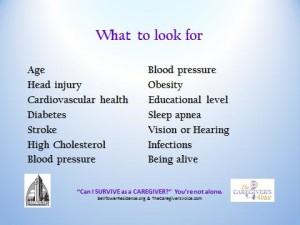 Over the last two decades, we’ve grown more aware of dementia, causes, and symptoms. Yet, families’ lives are turned upside down when a well-intentioned doctor hastily diagnoses a loved one’s condition as dementia.
Over the last two decades, we’ve grown more aware of dementia, causes, and symptoms. Yet, families’ lives are turned upside down when a well-intentioned doctor hastily diagnoses a loved one’s condition as dementia.
Before we overview 15 diagnostic criteria used by medical professionals, some caveats are in order.
Over the years, I’ve witnessed families grow distraught after leaving the primary doctor’s office upon receiving a hasty diagnosis of dementia, Alzheimer’s, or Parkinson’s. Although, primary care physicians, emergency room personnel, and even physicians assistants have medical expertise and have seen a lot depending on the number of years of service, they are unlikely to specialize in dementia diagnosis and care.
Families, who suspect dementia, are advised to seek a proper diagnosis by geriatric assessment team. Such team members work together to arrive at a more accurate diagnosis than an internist will likely give. Team members include a geriatrician or geriatric doctor who specializes in geriatric medicine–diseases of the elderly (who often have multiple illnesses simultaneously). His/Her assessment is integrated with that of a geriatric social worker, therapist, psychologist or psychiatrist, speech pathologist to determine whether or not dementia is the cause of one’s symptoms such as bouts of forgetting, slight tremors, momentary imbalances, and disorientation.
The geriatric assessment team takes a medical history, and performs a physical, neurological exam, lab tests, and a mental acuity test. Below are 15 of the criteria they use to arrive at a diagnosis.
- Older age: At age 85, the probability of living with dementia approaches 50%.
- Head injury: Repeated concussions that include loss of consciousness (e.g., while playing football or engaged in other risky sports and occupations), can contribute to various forms of dementia including Alzheimer’s and Parkinson’s.
- Poor cardiovascular health will reduce blood flow and oxygen to the brain.
- Diabetes: Alzheimer’s – is it really type III Diabetes?
- Stroke caused by a blocked blood supply in the brain.
- High cholesterol: Clogged arteries reduce oxygen to the brain.
- High blood pressure increases risk for stroke.
- Obesity and lack of exercise: Studies show that exercise contributes to better brain function and better weight management.
- Lower educational level or a less actively challenged brain results in lower brain cell reserves hastening onset of dementia symptoms.
- Sleep apnea reduces oxygen to the brain and has been linked to cognitive deficits related to Alzheimer’s.
- Impaired vision or hearing causes one to withdraw from social situations, which contributes to dementia.
- Stride or gait a shuffling gait or small steps may be an early marker of Alzheimer’s or Parkinson’s.
- Infections may cause long-lasting inflammation linked to Alzheimer’s.
- Family history – genetic history contributes to up to 5% of the incidents of dementia diagnoses.
- Finally, just living causes dementia. 😉 If you live long enough, see item 1.
CAVEAT: These fifteen diagnostic criteria must be evaluated together. One criterion, such as item 12, could be caused by arthritis with no connection to dementia. A geriatric assessment team or geriatrician evaluates a variety of life factors that enable a proper diagnosis.
For more information, read these related articles:
TYPES of Dementia – Leading causes
https://thecaregiversvoice.com/tips-caregivers/types-of-dementia-leading-cause/
TYPES of Dementia – Rarer causes
https://thecaregiversvoice.com/tips-caregivers/types-of-dementia-rarer-causes/









I very much appreciate the article on diagnostic criteria for Dementia. I just visited my Dad in Florida. He is in a hospice now, and the medical team anticipates his kidneys will shut down soon due to the spread of cancer. Although he has been a heart patient for 25 years, maintained for the last seven by a V.A.D. machine that has lasted longer than anyone anticipated, I never suspected that his heart condition could lead to Dementia symptoms. However, during my visit, as the hospice doctor did an intake on my Dad which included a thorough medical history, I realized that he has many of the criteria listed in the article, including many incidences where oxygen flow to the brain was significantly impaired. I’ve worked with Dementia patients for years, but it never once dawned on me that my Dad’s increasing confusion, disorientation, and unsteady gait over the past several years could be symptomatic of the same disease I had seen so often in others. After my departure, my Dad fell, and his heart stopped. Amazingly, he came back from being unresponsive, but he is now even less able to speak and process information coherently. It was comforting to read your article and be able to apply the criteria to my Dad, as my experience with Dementia makes it easier to understand what he is currently going through. Thank you, Brenda!
My pleasure, Lynette.
Thank YOU for taking time to share details of your visit with your father on hospice.
Your experience will help family members walking along a similar path feel comforted knowing they’re not alone.
The post came out beautifully, Brenda! Thank you so much! I hope that the story of Ole, Amber and Kiki will uplift some hearts that need uplifting. I’m happy to add that since writing the piece, Amber has become a more regular fixture at Ole’s new home, Sunrise Assisted Living in Oakland, CA, and is bringing a lot of joy to many of the residents there 🙂
I didn’t know he was at Sunrise. I have worked with them here in Southern Calif. I’m glad they’re allowing Amber “visitation rights.” 😉